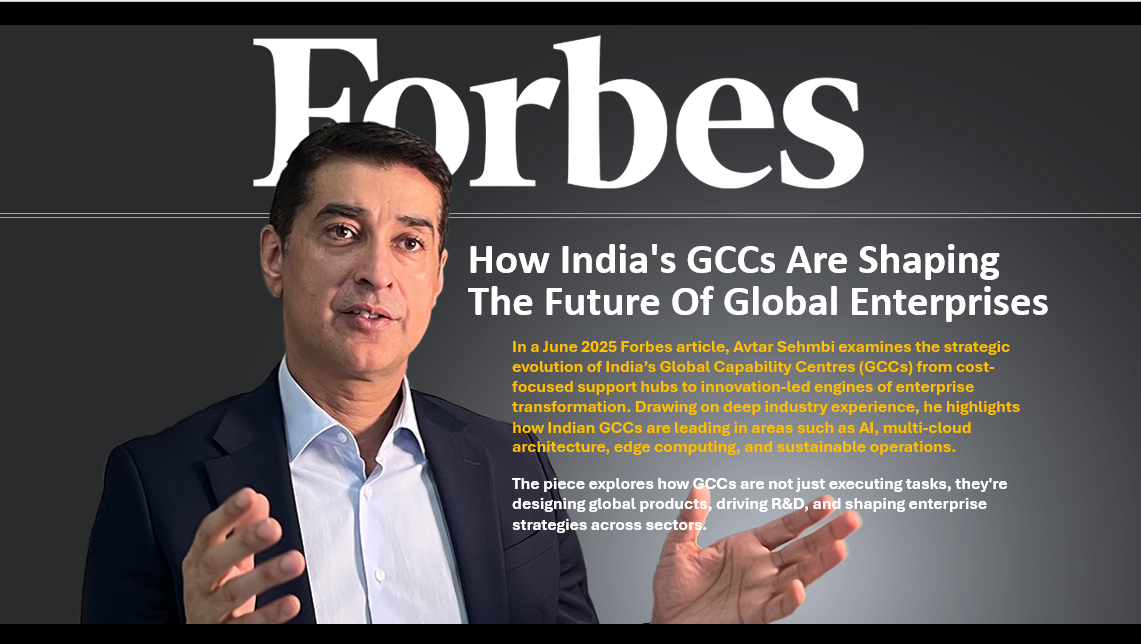In a June 2025 Forbes article, Avtar Sehmbi examines the strategic evolution of India's Global Capability Centres (GCCs) from cost-focused support hubs to innovation-led engines of enterprise transformation. Drawing on deep industry experience, he highlights how Indian GCCs are leading in areas such as AI, multi-cloud architecture, edge computing, and sustainable operations.
LONDON, GB / ACCESS Newswire / July 15, 2025 / How India's GCCs Are Shaping The Future Of Global Enterprises By Avtar Sehmbi Forbes Technology Council

How GCCs Are Shaping The Future of Global Enterprises
Having spent decades leading large-scale digital transformations across global markets, I've experienced firsthand how enterprise operating models evolve in response to disruption, scale and strategic necessity. One of the most significant shifts in the last decade has been the rise of global capability centers (GCCs). And if there's one geography that's shaped this evolution, it's India.
India has emerged as the nucleus of the global GCC ecosystem. This didn't happen overnight, and it didn't happen by chance. I've worked closely with leadership teams building out capability centers in every region, from Central Europe to Southeast Asia. Time and again, India stands out as the most strategic choice.
Why India Is Poised To Continue Leading
Every time I've assessed potential GCC locations, whether for scalability, risk mitigation or access to digital skills, India has consistently surfaced as the most compelling option. The foundations are rock solid. India offers a large and evolving tech talent pool, mature delivery models and a cultural readiness to work across time zones and functions.
Recently, I've seen significant traction in Tier 2 cities such as Coimbatore and Jaipur, which offer cost-effective talent with strong retention metrics. Incentives from the Indian government, including special economic zones (SEZs), fast-track approvals and tax benefits, further strengthen the case for long-term investment.
One of the most underrated yet foundational strengths of India's GCC ecosystem is its education pipeline. Having led global technology teams for decades, I can confidently say that the scale, quality and consistency of India's talent output is unlike anything I've seen elsewhere.
Institutions such as the Indian Institutes of Technology (IITs) and top private universities have partnered with industry to evolve their curricula. Today, they offer courses in relevant subjects such as AI, blockchain, data engineering and cybersecurity.
Equally important is India's culture of continuous learning. Upskilling is the norm, not the exception. Platforms like Coursera, upGrad and corporate academies help ensure professionals remain current and future-ready.
This academic infrastructure, combined with a digital-first mindset, enables companies to build large, agile and globally integrated teams with confidence. In a world where tech capability defines your competitive edge, India's education system is one of its greatest strategic assets.
The Market Speaks For Itself
The latest data mirrors what I've seen on the ground. India now employs more than 1.6 million professionals in this sector. It's projected that by 2028, there will be more than 2,100 GCCs employing 3.4 million professionals with a combined revenue in excess of $90 billion.
These are no longer just back offices. These GCCs are leading R&D labs, managing global cloud platforms, securing digital ecosystems and developing AI solutions for worldwide markets.
Managing The Realities
Although I've witnessed the tangible advantages India-based GCCs deliver across most of the firms I've worked for, including global giants such as Deloitte, HSBC and Cigna, there are operational realities to manage. Talent attrition in Tier 1 cities, especially in high-demand functions like AI, DevOps and cybersecurity, can be a challenge. Competition across GCCs is fierce, and professionals have multiple market options.
One of the strategies I've used is to split engagement between Tier 1 (e.g., Hyderabad and Bengaluru) and Tier 2 (e.g., Chandigarh and Jaipur) locations and invest in internal mobility. Supply and demand naturally play a part across locations, but talent is very much viable in Tier 2 locations.
Additionally, regulatory dynamics, including labor law compliance, data localization and taxation, require proactive governance. The presence of a strong legal and compliance team is essential.
Finally, cultural integration plays a pivotal role. Successful global-India integration hinges on shared context, mutual values and co-ownership of outcomes. When this alignment is missing, silos form. When it exists, trust and innovation flourish.
The Ultimate Validation
Indian-born and India-trained executives are now leading some of the world's most influential companies. That, to me, is the ultimate validation of India's maturity, talent and leadership pipeline.
For example, Sundar Pichai, CEO of Alphabet and Google, grew up in Chennai and was educated in India before rising to lead one of the world's most powerful companies. Satya Nadella, CEO of Microsoft, studied in Hyderabad and led the company's transformation into a cloud-first, AI-led enterprise.
These leaders often started in technical or consulting roles within Indian operations or multinational firms with a strong GCC presence. What sets them apart is their hands-on understanding of how to scale and transform complex enterprises.
In my own experience advising Fortune 500 boards and building global capabilities, I've seen this trend accelerate. India is no longer just a source of execution talent. It's producing globally relevant CxOs with both operational depth and commercial foresight.
For organizations investing in India-based GCCs, this can be a long-term strategic advantage. These centers don't just deliver outcomes. They build the leaders who will define enterprise success in the decade ahead.
Contact Information
Avtar Sehmbi
Global CTO | COO
avtarsehmbi@outlook.com
+447481825362
SOURCE: Avtar Sehmbi
View the original press release on ACCESS Newswire:
https://www.accessnewswire.com/newsroom/en/banking-and-financial-services/how-indias-gccs-are-shaping-the-future-of-global-enterprises-1048818
